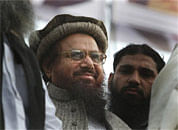
Long-haired jihadis toting automatic weapons patrolled a mosque last week as the cleric who heads the militant network blamed for the Mumbai attacks preached inside.
The group's supporters collected funds in the courtyard and later marched through this eastern Pakistani city, calling for the death of those who insult Islam.
The resurgence of the group could chill the first round of peace talks between Pakistan and India since the attacks.
India is insisting the negotiations tomorrow to focus on Pakistan's efforts to rein in groups such as Jamaat-ud-Dawa; Pakistan wants all issues, including Kashmir, to be on the table.
The US has urged the two nuclear-armed nations to resume dialogue despite Indian concerns about the Pakistan's crackdown on militants. Both nations mobilised troops to their shared border as tensions spiked following Mumbai.
Another major attack by Pakistani militants on Indian soil would put New Delhi under intense domestic pressure to mount a military response.
India, the US and the UN allege Jamaat is the front group for Lashkar-e-Taiba, which they charge carried out the attacks in November 2008 that killed 166 people in Mumbai.
Seven militants identified as members of Lashkar by prosecutors are currently on trial in Pakistan charged with planning and carrying out the attacks. The sole surviving alleged gunman in the attacks, Ajmal Kasab, a Pakistani with links to Lashkar, is on trial in India.
Lashkar was founded in the 1980s by Hafiz Saeed with the assistance of Pakistan's security agencies to wage war against India in the hopes of wresting the Indian portion of Kashmir away from New Delhi. The group claimed responsibility for numerous attacks there, but the government banned it in 2002 following pressure from the US after the Sept 11 attacks.
Saeed is now the leader of Jamaat, which claims to be focussed only on charity work. It runs a large network of Islamic schools and clinics, and participates in disaster relief.
Members of Jamaat say there is no link between it and Lashkar. But even Rana Sanaullah Khan, who is the law minister in Punjab, said the two are simply different wings of the same group.
After the Mumbai siege, Saeed, a 60-year-old former Islamic studies lecturer, was placed under house arrest but was freed in June last year by the Lahore High Court, which said there was no evidence he was involved in any wrongdoing.
In October, a court ruled there was no case against Saeed and found that the government had never formally prohibited Jamaat. The government has appealed to the Supreme Court.
Even before the court ruling, however, critics said Pakistan was not aggressively enforcing the ban.
In this Feb. 5, 2010 photo, Hafiz Saeed, the leader of a banned Islamic group Jamaat-ud-Dawa is surrounded by his supporters during an anti-Indian rally to show solidarity with Indian Kashmiris, in Lahore, Pakistan
Deccan Herald is on WhatsApp Channels| Join now for Breaking News & Editor's Picks